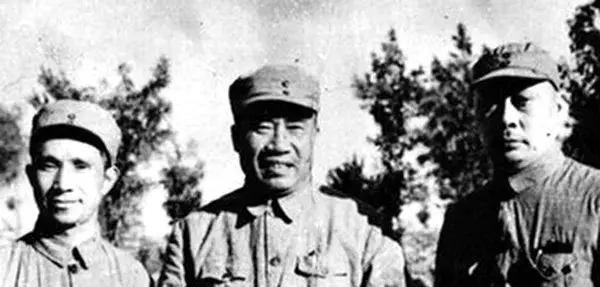As everyone may know, the Chen Su army that made the enemy feel frightened and made countless meritorious contributions on the battlefield of liberation refers to Chen Laozong, commander of the East China Field Army, and General Su Yu, deputy commander, so it is called Chen Su's army. These two are the soul of the East China Field Army and the backbone of this unit. Under the command of the two of them, the East China Field Army created many classic battles on the battlefield of liberation and was also one of the main field armies of our party in fighting against the enemy.
In the first battle after the establishment of the East China Field Army, in the Battle of Subei, an integrated ace division of Chiang Kai-shek was annihilated, forcing the division commander Dai Zhiqi to choose to kill Cheng Ren and be loyal to Chiang Kai-shek when he was cornered and unwilling to surrender. This battle was also the first annihilation battle fought by the East China Field Army after it left the division, and thus created the beginning of the East China Field Army's war of annihilation. Looking at the battles experienced by the East China Field Army on the battlefield of liberation, the famous Battle of Menglianggu is a relatively difficult war of annihilation. The opponent was the reorganized 74th Division, which claimed to be the first trump card of Chiang Kai-shek's military clique, and the division commander Zhang Lingfu was also a battle-hardened fierce general. In the face of such a difficult hard bone, the commander of the East China Field Army, General Chen Laozong, and the deputy commander Commander Su, still decided to eat this enemy, and General Chen called this battle a million troops and took the first rank of general.

Commander Su, General Manager Zhu, And General Manager Chen
The East China Field Army fought on two fronts, sending an elite ace column to annihilate Zhang Lingfu's reorganized 74th Division, and then sending a part of the column to block the enemy reinforcements. Fighting on two fronts, Hua Yezheng and deputy commanders withstood tremendous pressure to complete the battle. It should be known that if in the Battle of Menglianggu, the blocking corps or the offensive legion are broken by the enemy, then the East China Field Army will suffer the danger of being surrounded by the enemy. It is said that during this battle, Commander Su, who had always been calm and calm, was also anxious and walked around the huaye front command post. When the good news came from the front line, the two commanders of Huaye were relieved. After all, in the Battle of Menglianggu, Hua Ye faced an opponent of the reorganized 74th Division with its equipment and elite and strong combat effectiveness.
In the Battle of Menglianggu, the 74th Division was completely annihilated, and HuaYe set a precedent for annihilating the five main aces of the Nationalist army. In such a vicious battle as Meng Lianggu, Huaye soldiers can win, and in the subsequent battles, the East China Field Army will fight more and more, and has created a series of classic battles on the battlefield with fewer victories. As the commander of this unit, General Chen Laozong, the deputy commander Of Su Commandery, naturally made great contributions.
After this, the two commanders joined forces to command, the famous Battle of Eastern Henan, the Battle of Huaihai, and the liberation of Shanghai. Since Shanghai was the economic center at that time, in order not to destroy the city in the war, in the liberation of Shanghai, Huaye soldiers all used light weapons to fight against the enemy. It was also under the command of Commander Su that the rat thrower was adopted to lure the enemy out of Shanghai and annihilate them, creating a precedent for the liberation of large cities with light weapons.
It can be said that during the entire period of the Liberation War, Chen Laozong and Commander Su jointly created many classic battles, and according to statistics, during the Liberation War, Huaye annihilated more than two million enemies, ranking first among the five major field armies. Laozong Chen and Commander Su were not only the best partners during the liberation period, but at the same time, after the end of the War of Resistance Against Japanese Aggression and during the Liberation War, Mr. Chen was also Commander Su's immediate superior. As we all know, since the establishment of the East China Field Army, the commander has always been General Chen Lao, and the deputy commander has always been Commander Su, including the later reorganization into the Third Field Army, and Chen Laozong is still the immediate boss of Commander Su.
In fact, after the end of the War of Resistance Against Japanese Aggression, by the time of liberation, in addition to Chen Lao's boss who was always commander Su, there was also another boss who also served as commander Su. He was Zhang Dingcheng, one of the founders of the western Fujian base area, a veteran revolutionary with profound qualifications, and he was much older than Commander Su in terms of seniority. In this way, just after the end of the War of Resistance Against Japanese Aggression, the units of the New Fourth Army that remained in central China, including local guerrilla units and county brigades, were unified under the jurisdiction of the Central China Military Region. Zhang Dingcheng was appointed commander, and Commander Su at this time was appointed deputy commander of the Central China Military Region. In this way, after the end of the War of Resistance, Zhang Dingcheng became the immediate boss of Commander Su. Of course, this situation did not last long, and in November of the same year, when the Central China Military Region was reorganized into the Central China Field Army, Commander Su was appointed commander of the Central China Field Army.